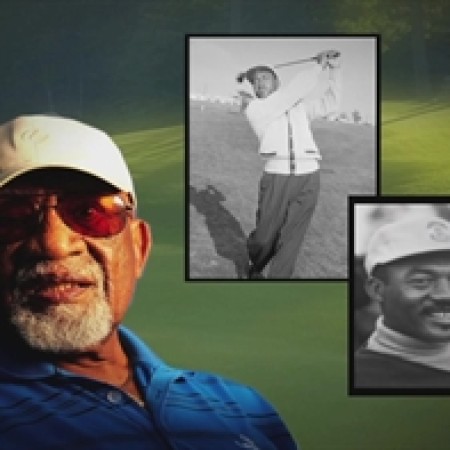Even if you don’t like sports you probably know the name Jackie Robinson. In 1947 he became the first African American to play in the major league baseball league (MLB) in the modern era. He crossed the color barrier and was a pivotal figure in the desegregation of baseball and sports. Many books have been written about him and a movie, “42”, about his life was released in 2013. He is known for both his courage and his skill and deservedly so. Along the same lines we know the name Rosa Parks, the brave Civil Rights activist who, in 1955 in Montgomery, Alabama, refused to sit in the back of the bus in the “Colored” section, instead keeping her place in the “White” section in the front of the bus. She worked closely with Martin Luther King Jr. and became the face and symbol of the Civil Rights Movement.
Few of us knew the name Charlie Sifford before Wednesday, February 3, 2015, the day he died. Ironically, he died the day before Rosa Park’s birthday. But his accomplishments and feats of courage rival those of Jackie Robinson, Rosa Parks and a multitude of others who helped to bring equal rights to America and contributed to the tearing down of racial and ethnic prejudices that have so marred our society.
Charlie was the first African American golfer permitted on the pro tour (PGA). He wasn’t permitted in until 1961, when he was 38 years old, an age when most golfers were winding down their careers. He endured the typical harassment and abuse that was common for black people in a white society in the 1960’s. He was not allowed to eat in the same restaurants as his fellow golfers; he was verbally abused by the crowds; people actually took his golf balls and threw them away; he was never invited to play in the Master’s Tournament, the most prestigious and sought after golf tournament to this day. Like Althea Gibson, the first black professional tennis player, Charlie’s sport is an individual one, not a team one. Thus, he had to face most of the abuse alone. He broke through the barriers without the help of teammates, owners or other African American golfers. But he did so with grace and pride.
“Charlie led by example, handling himself with great class and dignity inside and outside the ropes,” Jack Nicklaus said upon hearing of Sifford’s death. “We can’t underestimate the impact Charlie’s career has had on the face of golf today. Charlie was a leader and an inspiration.”
Current PGA of America President Derek Sprague called Sifford “an uncommon and faithful servant.”
“Inspirational” and an “uncommon and faithful servant? ” What a description for a golfer! But they weren’t talking just about a golfer, they were talking about the spirit and attitude of a man. It reminds me of John 13 where I read about Jesus washing the feet of His disciples. That would be a great description of Him…”Inspirational and an Uncommon and Faithful Servant.” And He wants us to be “Inspirational and Uncommon and Faithful Servants.” After He washes the feet of His friends He says:
“Now that I, your Lord and Teacher, have washed your feet, you also should wash one another’s feet. I have set you an example that you should do as I have done for you.” (John 13:14-15)
What would it take for us to be seen by others as “Inspirational, Uncommon and Faithful Servants” of Jesus? What would that look like in today’s world? We could learn a lot from a golfer and what it took to gain that reputation and make that kind of impression on his peers. After reading this I hope he is no longer “Charlie Who?”. I hope you remember that Charlie Sifford lived a humble, quiet and inspirational life as a servant. And I hope that would remind us to live as “Inspirational, Uncommon and Faithful Servants Of Jesus”.
What do you think?
How does it make you feel?
Blessings,
Steven

